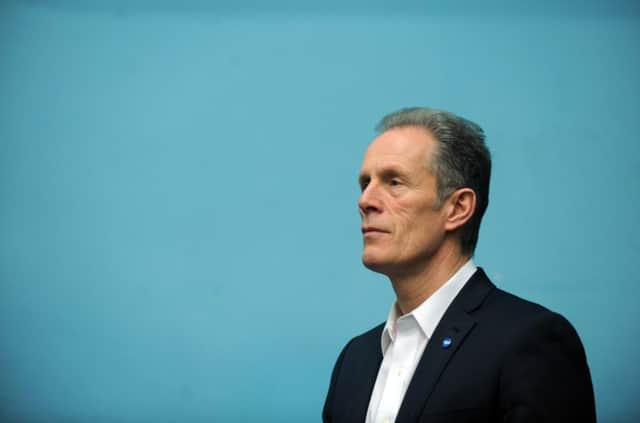Scottish independence: TV debates ‘vital for Yes’


The Yes side can draw on “talent” such as First Minister Alex Salmond and his deputy Nicola Sturgeon, Mr Jenkins argued, while rivals Better Together are “looking around for the least worst option”.
Mr Jenkins, a former head of news and current affairs at the BBC, told an audience at a referendum event at Glasgow University that broadcasting would present an “enormous opportunity” in the final weeks of the campaign.
Advertisement
Hide AdAdvertisement
Hide AdMr Salmond has repeatedly challenged the Prime Minister to a live debate, while Better Together leader Alistair Darling has said he is ready to go head to head with the First Minister.
Mr Jenkins said: “I think broadcasting is an enormous opportunity - it is one of the key areas where we are going to win this referendum.
“In the final four, five, six weeks, those big broadcasting debates are going to be enormously important.
“I am just so much happier we have the talent we have in the Yes campaign.
“Better Together are having real, real problems about who they are putting into (television) studios.
“I think in terms of finding people who are compelling, convincing and likeable, I think they are looking around for the least worst option.”
Mr Jenkins also defended his former employer against accusations of political bias.
During the question and answer session with Yes supporters and undecided voters, he said: “I am not happy and I am not satisfied with everything I see coming from the BBC, but I accept that mistakes are made and sometimes the wrong decisions are made.
Advertisement
Hide AdAdvertisement
Hide Ad“From my own experience of the BBC, the notion of some sort of systemic, corporation wide agenda to do us down is just not right.”
Mr Jenkins answered questions on a range of issues related to independence at the event, held on the eve of the 16-week regulated referendum campaign period.
Asked by one audience member whether “the gloves should come off” during the final phase of the campaign, the Yes Scotland chief executive stressed the “positivity” of the Yes campaign.
He said: “The ratio is about 80:20. We are positive 80 per cent of the time, and negative 20 per cent of the time.
Mr Jenkins accused No campaigners of “utter fixation” with Mr Salmond.
“It is like the red mist comes down and the switch is flicked whenever his name comes up,” he said.
“I think this fixation is a real fundamental weakness in their campaign.”
Earlier, Mr Jenkins gave a speech in which he set out his arguments for independence.
Advertisement
Hide AdAdvertisement
Hide AdHe said: “We now have the biggest grassroots movement in Scottish political history with hundreds of local groups, and tens of thousands of active volunteers.
“Yes groups don’t hang around and they don’t ask permission from HQ. They form in local communities and then they multiply and they innovate and campaign constantly, and most of all they keep talking to people. They know they are part of a cause, part of an idea that is worth sharing and spreading.
“Yes is the creative option, the option with imagination. The Yes campaign is both more organic and more dynamic than our opponents. We are seeing glimpses of what an independent Scotland would be like, a more engaged and a more determined population, a country of active citizens.”
He continued: “Independence will give us the powers to create more jobs, build a fairer country and make our people better off. With a Yes, we can make sure our wealth delivers more for people living here.
“We now have a clear picture of what a Yes vote will mean for Scotland and we are also seeing more and more clearly the consequences of voting No. And that emerging clarity about the two choices is why Scotland must vote Yes.
“As part of the UK, we are part of a society based on social exclusion, huge levels of income inequality, growing poverty rates, wide gaps in educational outcomes and shocking health inequalities. These differences largely arise from differences in assets and incomes.
“A Yes vote will give us a new sense of confidence and will harness the energy and skills of our people, amplifying the great determination and vision that we are seeing in the Yes groups and volunteers around Scotland.”
SEE ALSO